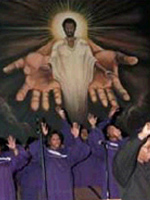 Lately I've been reading a remarkable book titled The Elephant and the Flea: Reflections of a Reluctant Capitalist written by Charles Handy that's published by the Harvard Business School Press.
Lately I've been reading a remarkable book titled The Elephant and the Flea: Reflections of a Reluctant Capitalist written by Charles Handy that's published by the Harvard Business School Press.
Handy, the son of a Church of Ireland rector, is a veteran lecturer on business subjects. While his book is aimed primarily at individuals who are trying to figure out how to make a living in unpredictable times, it has a message clearly relevant to theological school boards, particularly those responsible for small struggling schools.
In Handy's view we are coming into a time in which entrepreneurs will flourish while large, lumbering organizations will stumble and collapse of their own weight and lack of imagination. Hence the book's title. In the author's vision it's "Goodbye elephant, this is the era of the flea."
In the world of North American higher education, even a theological school as large as Gordon-Conwell Theological Seminary with its 1,700 students is scarcely even a flea when it's contrasted to such elephantine institutions as the great state universities of the U.S., with their tens of thousands of degree-seekers. By size of their student bodies, the seminaries of the United States and Canada are fleas one and all.
What's happening in the economic and political world, says Handy, is "disintermediation," the disappearance of the middle. The communications revolution is radically shortening the chain of distribution between the source and the end user. Seemingly the user can now achieve almost direct access to the source.
But not quite. "The reason is that information without interpretation is only data," Handy writes. "To turn it into knowledge that is useful requires analysis, an understanding of the context, and a technical awareness of the field in question.... Most of us will have neither the time nor the inclination to educate ourselves in most of life's arenas. The middles of many industries, therefore, will still be needed, but in a new form. The delivery organizations will be replaced by a variety of guides, interpreters, and teachers -- individuals or small firms, mostly operating electronically, adapting the wealth of data to your needs."
Handy predicts that many of the middle institutions put under threat by the new forces will fail to respond quickly enough to survive the changes ahead. "That is because you have to stand outside the box to see how the box can be redesigned. As often as not, the newcomers who fill the gaps will come from outside the industry and be unnoticed by the incumbents until after they have arrived."
Tracy Schier's article "Working the Numbers" describes how Gordon-Conwell leaders managed to think outside the box and materially alter the economic model by which the school delivered its product. Melinda R. Heppe's "Bottom Lines Dropping" tells how three other schools addressed the challenge of potentially diminished resources. These are important, instructive accounts.
But my read of what Charles Handy is talking about raises the prospect of far greater challenges ahead for theological education than simply meeting the necessity of achieving economic stability in an unpredictable economy.
The raw material of this "industry" would seem to be the accumulated wisdom of the churches, made applicable to the needs of our time by gifted and holy thinkers. The end users would seem to be students who find themselves called to acquire this knowledge so they can serve the mission of the churches.
The middle? It might continue to be theological schools more or less as we have known them. But it also might not. How else might the churches' wisdom be cultivated and passed on to those who need it? Would those different ways cost less, be pedagogically more effective, form holier ministers, appeal to more students, recruit new people?
Contemplating questions like this lies at the very heart of good board work. And the answers may distinguish the flourishing fleas from the failing elephants.
